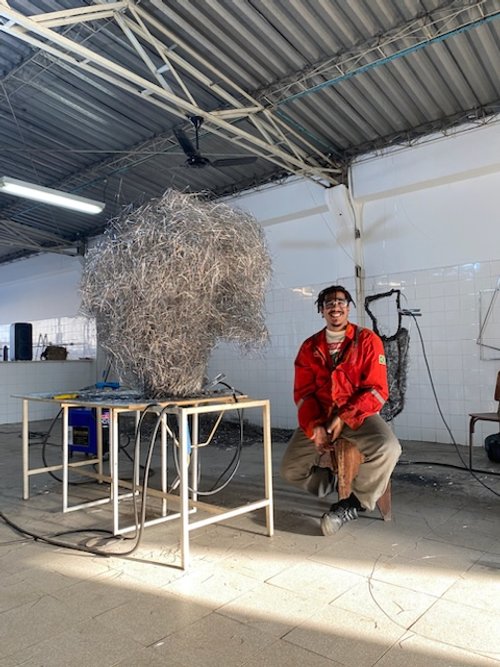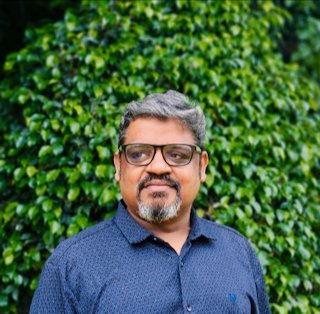Spring 2024 Residents
This 3-Month Residency program is by invitation only. While in residence, the scholars, artists, journalists and activists take part in the activities of the CRACS Co-Lab, remotely and when possible, in person. In addition to attending events, and participating in relevant reading and study groups, our virtual residents will share their work and their practices with each other and affiliated CRACS Co-Lab faculty and graduate students.
-

Iagor Peres
ARTIST
I have been looking for ways to remove the body from the traps of vision and thus, observe other visible and invisible densities that make up our relationships in space, to critically think about their agencies, formativities and the way we see them in the world. Trying to understand how we deal with what escapes a name and what we cannot see. To that end, I focus on the creation of amorphous and unstoppable materialities, the result of the combination of synthetic and organic compounds that permeate most of my works.
I situate my practice in the friction between sculpture, video, installation, and performance, reflecting. I’ve been asking myself, how do we dismiss the idea of Thing from the matter’s recategorization processes? How and why we separate the Things, feeding a narrative created by a world revealed in luminosity and vision traps. Doubting the apparent world and establishing dynamics between the removal and positioning of bodies (materials) in spaces, I have been working on questioning production’s tools of difference developed by white-western thoughts concerning bodies not understood as “Life.”
Member of the Carni Collective – Coletivo de Arte Negra e Indígena, currently participating in the PEI – Programa de Estudios Independientes at MACBA in Barcelona. Winner awarded at the PIPA Prize 2023, Prince Clauss Seed Awards in 2021, Premio Foco 2022 and at the 6th Edition of the EDP Nas Artes Prize at Instituto Tomie Ohtake, SP, 2018. Participant in the CCSP exhibition program in 2020. Resident at Villa Waldberta, Munich, GER for the residency PlusAfroT, 2019. In the same year, he was a resident in Lugar a Dudas, Calí, Colombia.
-

Elo Nunes
ACTIVIST
Black woman, mother, feminist, social scientist, activist, restorative justice facilitator, researcher and integrative therapist. In my professional and academic trajectory, I aim to contribute to the visibility of the daily lives of black women from an intersectional theoretical intertwining and political practice, valuing the resistances that are being sewn and that can reveal possible paths and actions aligned with social justice, with nature, (re)returning to ancestral knowledge and practices for life and for good living. In this perspective, I seek to deepen the analysis of the work of artisanal fisherwomen in the Recanto do Ipiranga in Sepetiba, women who resist in the shellfish picking, mostly black women responsible for the sustenance of their families. Faced with a scenario of socio-environmental violations and conflicts, of the denial of basic rights, they struggle to perpetuate their traditional knowledge, their work and autonomy.
-

Silvia N. R. Baptista
A Black feminist researcher of quilombola origin, she is a member of the Popular Collective of Women and Web of Solidarity of the West Zone of Rio de Janeiro (Brazil). She has an academic background in pedagogy and is also a specialist in phytomedicine management from the Drug Research Institute of the Oswaldo Cruz Foundation (Farmanguinhos-Fiocruz). Her MA degree is from the Institute of Scientific Information and Technological Communication in Health of the Oswaldo Cruz Foundation (ICICT/FIOCRUZ).
She is currently a PhD Student at the Research Institute in Urban and Regional Planning of the Federal University of Rio de Janeiro (IPPUR/UFRJ). Her PhD Research follows the directions of militant research, having a trajectory linked to agroecology, agrobiodiversity, and the various modalities of agriculture. It defends an epistemology derived from black, peripheral and communitarian feminisms. She focuses on the political action of black women in confronting hunger and food insecurity, and investigates the flows between the space-time of agriculture in Rio de Janeiro, paying particular attention to the patterns of racial segregation, in connection with food insecurity. In the dissertation she seeks to outline a program that simultaneously generates greater political incidence with the State and allows a quilombagem and defense of life in a territory of violence and fear.
-

Kavita Bundelkhandi
Kavita is a co-founder of Khabar Lahariya, and the co-CEO of Chambal Media, the rural media company that houses Khabar Lahariya. Kavita confronted caste, poverty and familial resistance to begin and complete her education, and she currently holds an MA in Political Science. She has reported on politics, crime and development from various districts of Uttar Pradesh and brought gender and caste stories into the mainstream in the country for over two decades. Apart from being editor in chief of Khabar Lahariya, she trains, guides and mentors other women from rural India to come into journalism. She is the region's first Dalit woman anchor to host her own news and views weekly, The Kavita Show, and the only Dalit member of the Editor's Guild of India. Kavita is also a TED speaker.
-

Disha Mullick
Disha is a writer and media practitioner and worked in publishing and journalism, before shifting to development and education. She is the co-founder of Chambal Media, a company that produces feminist media for rural audiences in India, and houses the all-women rural news brand, Khabar Lahariya. Her work included navigating Khabar Lahariya’s shift from print to digital media, and the challenges of sustaining an independent media collective in India, in terms of its content and business model. Her reportage, essays and reviews have been published in The Caravan, The Economic and Political Weekly, Vice, Article 14, India Development Review, Outlook and other publications. She is an Acumen and South Asia Speaks fellow, and is currently working with a New India Foundation fellowship on a collective biography of Khabar Lahariya.
-

Parthasarathi Muthukkaruppan
Parthasarathi Muthukkaruppan is Assistant Professor in the Department of Cultural Studies (from 2009), School of Interdisciplinary Studies at The English and Foreign Languages University, Hyderabad India. He holds a MA in English from Madurai Kamaraj University; an MPhil and a PhD in Cultural Studies from the English and Foreign Languages University Hyderabad. He was a doctoral fellow at Centre for the Study of Developing Societies (2007-2009), Delhi, India. He was a Visiting Faculty at the Department of English and American Studies, Potsdam University (Summer 2013) supported by DAAD. He has led anti-caste student movements in Hyderabad (2004-2009) and Madurai (1997- 2002) and actively involved in dalit trade union activism (1999-2002) in southern Tamil Nadu. His research and teaching interests include Dalit Studies, Critical Caste Theory, Transnational Caste and Race, Tamil Cinema, Violence Studies and, Media and Cultural Studies. His research works have been published in reputed journals including Economic and Political
Weekly, Social Scientist, Critical Quarterly, Rethinking Marxism and Biography. He has co-edited “Violence: Structure and Event”, Broadsheet on Contemporary Politics (Vol 3, No 1) published by Anveshi Research Centre for Women’s Studies, Hyderabad India. He is currently working on a book manuscript that historizes caste violence in contemporary India.